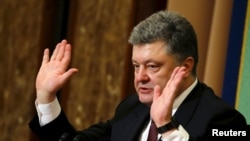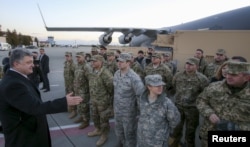Ukrainian authorities are laying the groundwork for President Petro Poroshenko to visit Washington early next year, hoping to shore up U.S. support against Russia and allay concerns about what a Donald Trump presidency means for Kiev.
Ukraine has relied on Western support and economic aid since street protests in 2014 which toppled a Kremlin-backed president and were followed by a war with pro-Russian separatists and Russia's annexation of the Crimea peninsula from Ukraine.
Some of Trump's campaign comments, from appearing to recognize Crimea as part of Russia to contemplating an end to U.S. sanctions on Russia, stoked fears in Kiev that Trump will mend ties with Moscow at Ukraine's expense.
Kiev is already wary of losing the European Union’s backing over the bloc's own sanctions, imposed on Russia over its seizure of Crimea and support for the separatists fighting government forces in eastern Ukraine.
EU diplomats say the bloc is likely to approve a six-month extension of the sanctions at a summit in December but that it may find it harder to renew them again after Trump is inaugurated in January.
Ukrainian officials say that whatever Trump said on the stump, they believe he won’t change U.S. policy on Russia and Ukraine.
"We are confident that the new U.S. administration will continue to work closely with the leadership of Ukraine, providing the assistance that is necessary to counter Russian aggression and carry out internal reforms," Prime Minister Volodymyr Groysman said in a statement to Reuters, echoing similar remarks by Poroshenko.
Trump's victory was cheered in the Russian parliament on Wednesday and raised hopes in Moscow that an easing of the sanctions would give succor to Russia's ailing economy.
The same day, Ukrainian dollar-denominated bonds tumbled in a sign of investors' concern about the potential impact of Trump's victory. Kremlin spokesman Dmitry Peskov said Trump's foreign policy approach was "phenomenally close" to President Vladimir Putin's.
But Kiev believes that bipartisan support for Ukraine in the United States is strong and that the Republican Party, which will control the U.S. Congress, has the backing of a large Ukrainian diaspora lobbying for a continued firm U.S. line on Moscow, a senior Ukrainian official told Reuters.
"The policy of the United States will be consistent," said the official, who spoke on condition of anonymity because of the situation’s sensitivity.
"It's not only about Trump," he added. "He's not a tsar, he's not an emperor."
Seeking reassurance
Despite these comments, Kiev has been seeking assurances of continued U.S. support.
"Mission in NYC done: more than 50 mtgs (meetings), 30 calls in 3 days to support UA (Ukrainian) resolution on human rights in Crimea and Donald Trump Pres-elect," Foreign Minister Pavlo Klimkin tweeted on Thursday.
He was referring to a resolution submitted to the United Nations condemning what Kiev says is discrimination in Crimea and calling on Russia to halt alleged rights violations there.
Deputy Parliament Speaker Iryna Gerashchenko, who is part of a working group in talks on ending the war in eastern Ukraine that has killed nearly 10,000 people, said neither Republicans nor Democrats had shown a desire to soften sanctions.
"It is also clear for me that a change of administration in the White House will not change the U.S. position," she told Reuters in an interview.
While Ukraine's main objective is ensuring that sanctions on Russian remain, Kiev also hopes that Washington will agree to supply it with lethal weapons, the senior Ukrainian official said.
Such aid is supported by two contenders to become Trump's secretary of state: former
House of Representatives Speaker Newt Gingrich and U.S. Senator Bob Corker of Tennessee. Ginrich met Poroshenko on a visit to Ukraine in September.
"We're preparing the visit of the president of Ukraine to the United States," the senior official said. He did not say how far preparations had progressed.
New ‘front’
Trump's campaign remarks infuriated many Ukrainians, and his election triumph was greeted by Ukraine's deputy prime minister as another "front" on which Kiev had to fight. Officials in Kiev fear his victory will embolden Russia.
Trump has praised Putin as a strong leader. The president-elect’s former campaign chairman, Paul Manafort, helped propel pro-Kremlin Ukrainian leader Viktor Yanukovich to power before he was part of the president-elect's campaign team.
Home Minister Arsen Avakov took to Facebook in July to denounce statements by Trump on Russia's annexation of Crimea, calling them a dangerous indulgence of the "dictator" Putin.
Oleh Lyashko, head of the opposition Radical party, initially said a Trump presidency would be "disastrous" for Ukraine, though he later qualified that by saying he hoped Trump's overtures to Putin were just "campaign rhetoric.”
Nadiya Savchenko, a servicewoman who became a symbol of resistance to Russia after being captured in eastern Ukraine and later freed, wrote an open letter to Trump urging him not to abandon Ukraine, or risk starting a new world war.
Trump "gives preference to Russia and in fact does not recognize Ukraine as a sovereign country," Kiev resident Volodymyr Nazarenko said.
In comments underlining the depth of concern among the population about Trump's election triumph, Nazarenko said: "He will talk to Putin and Ukraine doesn't mean anything to him. This is the most terrifying thing."






